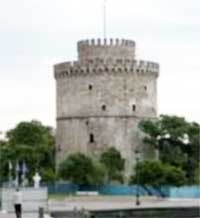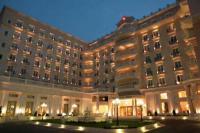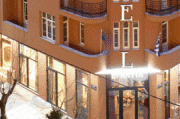Thessaloniki
Thessaloniki is called the second capital by the Greeks, since it is
not only the second largest city of Greece after Athens, but
also the capital of Northern Greece and Macedonia. It is
beautifully situated by the sea, and there are also many
interesting places in the city and its surrounding areas that
you can visit. Thessaloniki is home also of some of the most
famous sport unions and football clubs like PAOK, Aris and
Heracles. Thessaloniki has 2 national range TV stations, the
Greek state television channel 3 and Macedonia. The university
of Thessaloniki is the second largest of Greece therefore the
city is has a large number of students from all over Greece.
Every year during the International Thessaloniki Expo is held
the festival of Greek music and the film festival of
Thessaloniki. The city has many industries that most of them
located at the area of Sindos.
Thessaloniki is a great place to spend some time in all year
around, and even though it is a very big city, it is not as
polluted as Athens. The fresh sea breeze is almost always there,
and taking a walk in its harbour you get a nice view of the town
and the sea.
History Thessaloniki
was the sister of
Alexander the Great. She was married to a man named
Kassandros, and it was also he who founded the city in 315BC.
Before that, there was a much older settlement here called
Therme.
When the Romans came in the 2nd century BC, they appreciated the
important situation of the city, and made it an important center
for their military, commerce, and culture.
St. Paul the Apostle preached here, and during the Byzantine
period it was the second most important city after
Constantinople. There are still several churches here from that
time.
Even though the city's location gave its citizens many
opportunities for trade and cultural influences, it was also a
curse, since many nations wanted it as a stronghold.
The crusaders ruled in the city in the 13th century, and in the
15th century the Turks invaded. It was during the Middle Ages
that Thessaloniki became an important place for the Jews, and to
this day, the city has a very large Jewish community.
Thessaloniki was freed in 1912, but soon became involved in the
First World War. Many died in fighting side by side with the
Allies, and in 1917 a terrible fire made 80 000 people homeless.
During the Second World War the city was occupied by the
Germans, and 50 000 Jews were deported to the concentration
camps.
What
to See The medieval fortress on top of the town is worth visiting
and from there you also get a magnificent view. The area just below the
fortress is the oldest part of the city, and it is very nice to walk around
in this neighbourhood with its pretty houses and small, winding streets.
 The
archaeological museum has interesting ancient artefacts from different
time periods in Greek history. Of course, there are many more museums than
that, for example, the Museum of Macedonian Struggle, The Ethnological
museum, the Gallery of Fine Arts, the Technical Museum and the big
International Trade Fair. The
archaeological museum has interesting ancient artefacts from different
time periods in Greek history. Of course, there are many more museums than
that, for example, the Museum of Macedonian Struggle, The Ethnological
museum, the Gallery of Fine Arts, the Technical Museum and the big
International Trade Fair.
There are also excavations from ancient and Byzantine times in the city, and
many old churches. Ag. Dimitrios is the main church of Thessaloniki, since
this is also its patron saint (a Greek Roman officer who died in the 4th
century).
The White Tower is a remnant from the Turkish occupation, this used to be a
prison. In the harbour there is a statue of Alexander the Great, and on the
Aristotle square there is a statue of the philosopher.
You can also visit the Roman Baths, and the Roman square, as well as the
Galerius Arch (Kamara) from the 4th century. Worth visit is the Thessaloniki
Expo area where is located the TV tower.
There is much more to see in this fantastic city, but I would need a
separate site to cover it all!!!
Archaeological sites
Palace of Galerius (300 AD) in Navarinou Square. Imposing
buildings appropriate to the brilliance of the Roman capital of
the province of Macedonia. Roman Forum and Theatre in
Dikastirion Square. Roman Baths, to the north of Agios Dimitrios
church.
Nymphaion, an elegant, single-winged, circular building. One of
its cisterns is now the chapel of St. John the Forerunner.
Monuments-Churches
The Arch of Galerius was erected just before 305 AD in order to
immortalize his military victories in Asia Minor, Armenia, Syria
and Mesopotamia in the campaign of 297 AD.
The Rotunda, a round building of the early 4th century AD, was
built as a Pantheon or Mausoleum for Galerius. It has additions
from the early Christian era, dating from its transformation
into a Christian church, with unique mosaics from the time of
Theodosius the Great (379-395).
The Panagia Acheiropoietos (mid 5th century) and the church of
Osios David (inscribed Syrian cross-in-square form) (late 5th
century) - the Katholikon (church) of the monastery of Latomos -
are the two oldest early Christian churches still standing in
Thessaloniki.
The city reached its greatest heights during the Byzantine era
and its most important date from this period.
The Walls were built during the reign of Theodosius the Great
and surrounded the city from Dimokratia square to the
Eptapyrgion (a fortress with seven towers) and up to the later
White Tower, a work of Suleiman the Magnificent famous architect
Sinan (first half 16th c.).
Agios Dimitrios was restored in 1948 in conformation with the
two previous churches that were destroyed by fire, the first in
the 7th century, the second - which was constructed immediately
thereafter - in 1917.
The crypt, the easternmost section of the Baths, where in 303 AD
St. Dimitrios was imprisoned, martyred and buried, lies
underneath the south transept of the church.
Agia Sophia (8th c.), whose architecture represents a transition
between the domed basilica and the domed cruciform church.
The Panagia Halkeon (Our Lady of the Coppersmiths), in the form
of the Greek cross-insquare, was built in 1028, according to an
inscription above the west entrance.
Agia Ekaterini (13th c.), with a well-preserved facade and
fragmented frescoes within.
Agioi Apostoloi (14th c.) with ornate exterior decoration,
mosaics and frescoes from the era of the Palaiologue emperors.
Agios Nikolaus Orphanos (14th c. - Irodotou 20, Tel:
2310213627), with sumptuous 17th century frescoes, taken from
its dependent.
Vlatadon monastery, whose form has changed greatly from when it
was built in the 14th century.
Prophitis ‚has, built in 1360 by the monk Makarios Houmnos atop
the ruins of a Byzantine palace.
There are also a considerable number of churches dating from the
past-Byzantine period. Museums
The Archaeological Museum (HANTH Square, Tel: 2310830 538), with
exhibits of ancient, classical and Roman sculpture. The main
hall has an exhibition showing the evolution of Thessaloniki
from prehistoric times to the early Christian era. A special
wing houses the impressive, unique finds from Verging and
masterpieces of Macedonian metalwork. The collection of
prehistoric finds included objects from the Middle Neolithic
through the Early Bronze Age. The Sindos exhibition contains
finds from the cemetery of the archaic and classical periods -
silver, gold, iron objects, weapons, pottery, idols.
Museum of Folk Art and Ethnology (Vassilissis Olgas 68, Tel: 231
0830 591) with exhibits of the last 250 years in the life of the
nation (jewellery, weapons, household utensils, superb
collection of traditional costumes from northern Greece), and a
wealth of material of scientific interest.
Museum of the Macedonian Struggle (Proxenou Koromila 23, Tel:
2310229778) with exhibits from the period between 1878-1912
(costumes, uniforms, weapons and photographs of the freedom fig
hters).
Museum of the White Tower (Tel: 2310267832). Exhibition on the
art and history of Byzantine Thessaloniki from 300 AD to 1430
What to Do
Apart from the many sights of Thessaloniki, you can also go to one of the
many cinemas, theatres and concert hall. There is always something going
on here, and it is a good idea to get a newspaper on arrival to see
what's on at the moment.
You can also go to Halcidiki and Vergina from here, as well as to most
places in Greece here since the city has an airport and extensive boat,
bus and train connections.
Beaches There are no proper
beaches in Thessaloniki, but you can find several just outside. Most
people who want some real sun and sea usually go to Chalcidiki, but
there are also very nice summer resorts in Platamonas, Litochoro and
Katerini further south for
example.
Nightlife Thessaloniki has a
great nightlife and there is something for every taste. There are places
everywhere, but the most frequented are in the harbour, Ladadika, Krini,
Leoforo Nikis and in the Navarinou Square. Most bouzouki clubs are
situated near the airport.
Food and restaurants You'll find
excellent restaurants and taverns in the area below the Kastro, at
Ladadika and in Krini, but of course there are many more all over
Thessaloniki. Many places have their own specialties, and there are also
several international restaurants. Some of the specialities of
Thessaloniki is the famous Bougatsa (Cream pie) Loukoumades and Patsas (
Tripe Soup )
Shopping Being such a big city,
there are shops everywhere. The whole area around Aristotelous Square
and the White Tower have many boutiques, souvenir shops and bookstores.
Here, you'll also find many cafes and bars. In the main streets of
Tsimiski, Mitropoleos, Egnatia and the coastal Nikis you will find all
kind of shops. Many tourists from the neighbouring former Yugoslavian
republics and from Bulgaria will come often in Thessaloniki for
shopping. Every year is held the international exposition of
Thessaloniki (Thessaloniki Expo) .
Getting Around Local buses
and taxis are everywhere, but Thessaloniki is also a nice city for
walking in since it is easy to find your way around. You can also rent
cars and bikes, but it is not to be recommended for inside the city,
since it is hard to find parking spaces and many drive like madmen. From
Thessaloniki you can go by Ktel bus to Chalkidiki. The KTEL bus tickets
from Thessaloniki to Athens one way cost 35 EURO.
Getting There Thessaloniki has its
own airport, Makedoniko, and is connected with the whole of Greece through
boats, buses and trains. There are also ferry connections with many Greek
islands of the north and the south Aegean. The train station of Thessaloniki
is one of the biggest in the Balkans.
HOTELS IN THESSALONIKI
 Art
Apartments Art
Apartments
Doxis street 7 Ladadika, Thessaloniki
The accommodation located in the popular area of Ladadika in
Thessaloniki, Art Apartments offers fully furnished spacious
apartments modern decorated including Jacuzzi. This complex is
part of the chain Art hotels all rooms are spacious and have all
conforts and services, the rooms have comfortable beds of extra
comfort and a comfortable sitting area ideal if you are
intending to stay for long.
Each of the Apartments is nicely appointed with ornate lighting
and rich fabrics where you can relax after your tour in the
wonderful city of Thessaloniki.
The ideal location in the the historic area of the city allows
our visitors to have an easy access to all sights of
Thessaloniki.
 Hotel
Panorama 4 stars Hotel
Panorama 4 stars
Analipseos street 26, 55236 Panorama Thessaloniki
The Hotel Panorama located on the outskirts of the town on the
wonderful suburb of Panorama, the area is on nice green hills
With amazing views of Thessaloniki and the bay of Thermaicos,
the hotel has a traditional Greek and friendly atmosphere with
high quality of service.
Nested in luxury surroundings Hotel Panorama is pleasant place
to stay only few minutes away from the centre of the town with
easy access to the airport and the city of Thessaloniki as well
as all the interesting places of the area.
All rooms have excellent views to the surrounding landscape are
comfortable and elegant with balconies and they are equipped
with all modern facilities.
 Grand
Hotel Palace 5 stars Grand
Hotel Palace 5 stars
Monastiriou Street 305 Thessaloniki
Grand Hotel Palace combines a unique design and elegance with
all modern facilities and a cosmopolitan atmosphere in this
luxurious Neoclassical building in Thessaloniki.
The hotel is located near to the train station and the Port as
well as near to the commercial and business centre of the town.
the hotel is ideal for business including a business centre
equipped with all facilities, convenience and luxury combined
with a friendly environment of a high quality accommodation. the
hotel can also arrange your outdoors activities as excursions,
sea sports and boat trips. The hotel offers Fitness Centre,
indoors swimming pool, massage, sauna, elevator, non-smoking
rooms, facilities for disabled guests.
 Egnatia
Hotel 3 stars Egnatia
Hotel 3 stars
Antigonidon Street 16 Thessaloniki
The hotel Egnatia situated in an excellent location in the hart
of Thessaloniki it offers elegance and spacious rooms equipped
with wifi internet access and unique decoration of lively
colours each one with its own character including satellite
television. In the elegant lounge bar of the hotel you can relax
with a cup of coffee or with a cocktail.
You can have a free of charge free buffet breakfast before you
start your day exploring the city and its beauties the hotel is
near the all central sights and the business center. From the
hotel Egnatia you can walk to the most of the sightseeing
monuments of Thessaloniki like the Byzantine and the
Archaeological museums, the White tower, the Aristotelous square
and the wonderful promenade of the city.

see also
Mykonos Hotels
Santorini hotels
Samos hotels
Paros accommodation
hotels in Tinos
| Facts about
Thessaloniki*
|
Phone numbers*
|
| Size: |
International code: 0030 |
| Population: about 1000
000 |
Local code: 2310 |
| Cash machines: Yes |
Train Station 517517 |
| Internet cafes: Yes |
Thessaloniki Airport:471170,
473042 |
| Highest Mountain: |
Tourist Police: 554871,
544162 |
| Airport: Yes |
Hospitals: 837921, 357602,
451521 |
| Price rate: Average |
Traffic Police: 416654 |
| Subway: under construction |
Ambulance: 166 |
| Suburban rail: Yes |
Radio Taxi: 550500, 866866,
511855 |
| Buses: local and suburban
KTEL |
Archaeological Museum:830538 |
Thessaloniki map
*The info displayed may be inaccurate. If changes have been made, please let us know.
|


